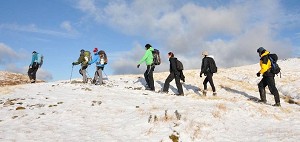
It's that time of year when many people, and much of the animal and plant world for that matter, turns its thoughts to romance and relationships. But we'll have none of that, so the other thing that people often turn their thoughts to is going for a nice walk with friends. The problem is that friends often ask their friends along and they in turn bring their partner and a couple of lads from the pub quiz team who are on a mission to get fit (it won't last). Before you can say “where's me gaiters?” you have a walking group and, as it was your idea in the first place and you have a map and a warm hat, it's your job to lead the walk.
I thought it would be useful to spend some time going over the main principles of group management, so that when you're back at the cars the walk can be pronounced a success and everybody will think what a great walking group leader you are and probably buy you some beer in the pub. It's worth a shot anyway.
Starting well
The 'Rule of Returns' states that the number of times group members will have to return to their cars to retrieve something that they've forgotten is in direct proportion to the age profile of the group members. Thus, an average age of 35 in a group of not more than ten will have one return for a walking pole, or the butties; and an age profile of 57 in a similar sized group will have six returns for a walking pole, maps, guidebook, camera, tablets, clean underwear, fresh socks, the wife, the dog, a fresh catheter set and drainage bag, and not including four returns to the car where the hiker will have forgotten what it was he went back for until lunchtime when he will suddenly discover he is only wearing one boot. (Note that surgical drainage bags should be kept strictly separate from hydration systems. Just a tip there.)
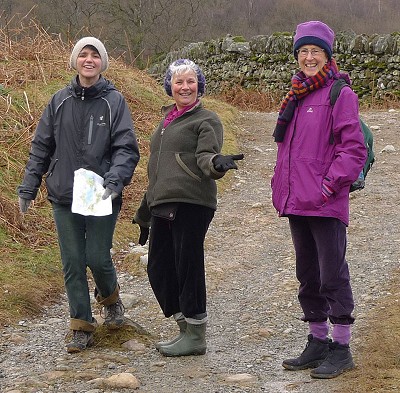
No?
Don't worry about it, nobody does risk assessments and those who do just tick a load of boxes on a badly photocopied form and sign the bottom. It says something about ice and snow and having good boots on. If you wander around the car park staring at people's boots, many will come to the conclusion that you're a bit odd. Any further intrusions into the checking of woolly hats and lunchboxes will likely attract abuse, so don't do it. In any case, what happens if you find that your pal Geoff from the quiz team, the one who has an anger management problem but knows everything about the English Football league, has duff wellies on and not proper hiking boots. Are you going to tell him? No. I thought so. You don't want to lose your Football Expert to a huff.
Just set off.
Incidentally, setting off in the wrong direction may be viewed by some members of your walking group as a bad omen for whatever is coming up. Learn to bluff your way out of this type of thing. Pass it off as an interesting loop in the route, not an early and prophetic blunder. If there's a church or something, point to that and explain its history (you may need to make this up).
Which brings us to...
Finding your way
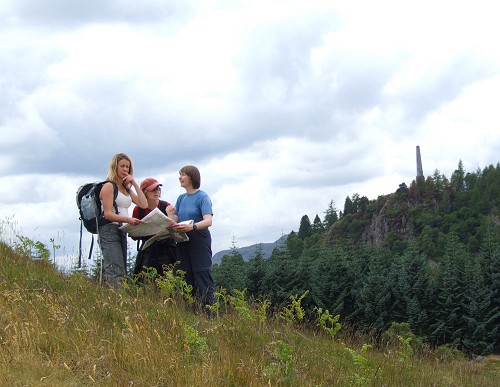
And, in turn, you don't actually need to know exactly where you are either. Your required skills are mainly those needed to convince the group that you know exactly where you are.
Is this clear?
Thus, you need to develop the skill of making the map fit whatever it is you can see. If you're in thick clag and all you can see is a stream with a wall next to it, find a stream with a wall next to it on your map and declare to the group “there”, pointing confidently at a relevant spot on the map. Making the map fit into random features is a skill which comes naturally to many people. Others worry far too much. It'll be OK. Don't worry about it, you're not up the Alps.
If you really don't know where you are, and let's face it, who does, you can blame any obvious errors - like an extra mountain appearing at the end of your ridge, or perhaps a waterfall, crag or small town not marked on your map - on government cuts affecting the efficiency of the Ordnance Survey. Distract attention from any serious blunders by banging on about what a work of art the old one inch maps used to be and how you could spend a whole winter's evening with Blackburn and Burnley spread out on the floor, sipping a nice malt and admiring the beautiful cartography. You'd have to gloss over the fact that these old maps were useless for finding your way and many of the contours were merely 'notional', obviously.
Managing challenging behaviour
1) Urination
Note that if three or more of your group are men over the age of sixty, they will quickly form themselves into a 'Prostate Club'. At any one time at least one member of the Prostate Club will be engaged in the act of urinating. This could hold up or split the group. You may even lose contact with one or more members of the Prostate Club, either temporarily or permanently. This doesn't matter too much although it is considered bad form to return to the cars with less than 80% of the number of people you set off with. Skilled walk leaders have even been known to return to the cars with walk members from other groups encountered on the hill. So, if the population of your group has increased, well done, but be aware that another walking group may be searching for their missing members, if, indeed they knew how many they'd started with in the first place.
For more general rules about urinating, it's only good manners to have it carried out in such a way as female urinaters can do it in a gaggle all at once behind a rock or a wall, possibly with a meerkatish sentry or lookout, and men can urinate to windward, in such a manner that nobody can see their willies and back spray is reduced to a minimum. Thus, in a mixed group, you need to designate a ladies and a gent's urination area. There will be no mixed urinating. This is just not right.
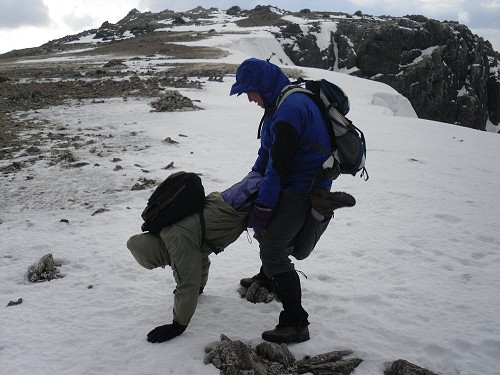
These are not allowed, except in pubs, cafés or tea rooms passed along the way. Pub landlords can sometimes get a bit irritable about this, so it's best to distract his/her attention by asking for ten glasses of iced water and a cup of tea whilst the dirty deed is done in the bogs at the back.
3) Slow walkers
Not to worry – see above. Try to achieve an 80% return (see above). Most slow walkers can safely be left to their own devices – many of them having reached a venerable age by surviving wars, shipping disasters and flu epidemics - so getting a bit dislocated on a walk through the White Peak will be either just the latest interesting adventure or at worst a minor inconvenience involving ringing a relative to come and pick them up from Buxton town centre.
Slow walkers can be encouraged to speed up by waiting for them and then setting off as soon as they've arrived. Alternatively, you can lighten their load by eating their sandwiches and drinking the contents of their flask. Next time you arrange a walk, give them the wrong location and time.
4) Fast walkers
There's something very wrong with fast walkers. Fast walkers are obviously trying to prove that they're much fitter than you are and have a better sense of where they're going. This is highly disruptive and needs to be dealt with very firmly. Fast walkers can be encouraged to stay with the group by the use of sudden and unexpected changes of direction. They will eventually come running up from the back claiming to have just bagged an outlying peak or something. Eventually, this strategy will probably tire them out. Alternatively you can give the impression that you're talking about them by suddenly going quiet if they look in your direction. They'll soon learn to stick around a bit closer. If you can affect an innocent smile, all the better.
Next time you arrange a walk, give them the correct location, but the time in GMT (if it's summer time), or eastern European time (if it's winter). This will make sure that if they try to follow you they'll be exhausted by the time they catch up.
5) Challenges to your authority
Mention it to Geoff, the Quiz team football expert and possible psycopath. He'll sort them out.
Maintaining interest along the way and post-walk feedback
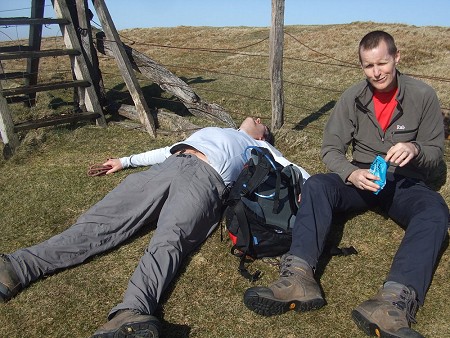
So just make up any old rubbish in the unlikely event that anybody asks a question. All yellow flowers are either dandelions or buttercups. White ones are daisies and little brown birds are sparrows, or robins if it's nearly Christmas.
If anybody argues, give them one chance, then if they continue, next time there's a walk, tell them the wrong venue and meeting time. Clever dicks, who needs 'em?
It's important to get as much positive feedback about the walk and how good you were as a walk leader as possible, so that you can feel smug about it all week.
At the end of the walk, try to tease out comments about what went right, how your choice of walk probably coincided with the best weather, your choice of the nicest of views and the way those who can't ever seem to keep up don't come any more even though the pace you have been setting has been ideal throughout.
You know what to do about people giving out negative feedback.
Finally – I suggest you learn the joys of walking by yourself or with a canine pal who thinks you're wonderful ... it's much better, honestly.
Good luck! Mike
About the author and about the artist


The illustration is by Patrick Latham (right) www.3rdmancartoons.co.uk. Patch is a freelance cartoonist and illustrator. He's available for private cartoon and caricature commissions as well as book, magazine and web illustrations.





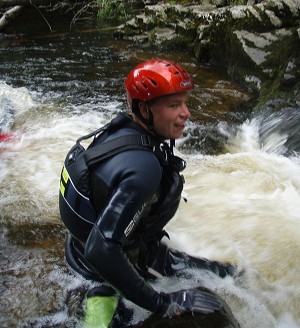
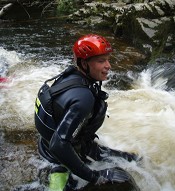
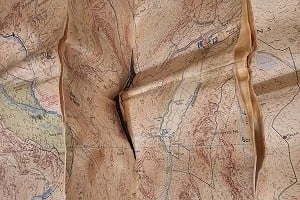


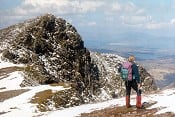
Comments